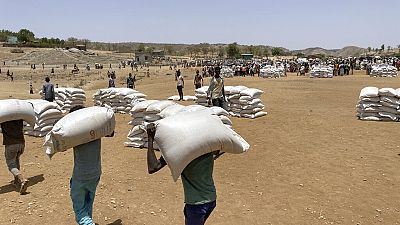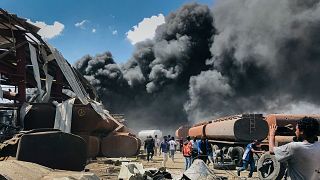Ethiopia
The head of the World Health Organization has described the ongoing crisis in Ethiopia's Tigray region as "the worst disaster on Earth".
He wonders if the reason global leaders have not responded is due to "the color of the skin of the people in Tigray."
In an emotional statement at a press briefing on Wednesday, WHO Director-General Tedros Adhanom Ghebreyesus said the situation caused by the conflict in his home country is worse than any other humanitarian crisis in the world.
Tedros asserted that the 6 million people in Tigray essentially cut off from the world have been "under siege" for 21 months. He described the Ukraine conflict as a crisis that has the global community potentially "sleepwalking into a nuclear war" that could be "the mother of all problems," but argued the disaster in Tigray was far worse.
"I haven't heard in the last few months any head of state talking about the Tigray situation anywhere in the developed world. Anywhere. Why?" Tedros asked.
In April, Tedros questioned if the world's overwhelming focus on Russia's war in Ukraine was due to racism, although he acknowledged the conflict there had global consequences.
The conflict in Ethiopia began in November 2020, and little humanitarian aid arrived after Tigray forces retook much of the region in June 2021. Aid has started flowing more substantially in the past few months but is widely described as inadequate to meet the needs of the millions of people essentially trapped there.
The resumption of basic services and banking remains a key demand of the Tigray regional leaders. Journalists have not been allowed in.
Tedros said the people of Tigray had no access to medicine and telecommunications and were prevented from leaving the region.
However, the International Committee of the Red Cross in recent months has reported shipments of some medications.
"Nowhere in the world you would see this level of cruelty, where it's a government (that) punishes 6 million of its people for more than 21 months," the WHO chief said. "The only thing we ask is, 'Can the world come back to its senses and uphold humanity?'"
Tedros called on both the Ethiopian and Russian governments to end the crises in Tigray and Ukraine.
"If they want peace, they can make it happen and I urge them both to resolve (these issues)," he said.
Also Wednesday, Ethiopia's foreign ministry said a government peace committee had adopted a peace proposal "that would lead to the conclusion of ceasefire" and that it would be shared with the African Union envoy working on mediation. Basic services would follow a ceasefire, the statement said.












01:07
Spain: at least 10 detained in anti-immigration clashes in Murcia region
01:14
Boeing reaches settlement with man who lost entire family in 737 MAX Crash
01:13
China and Ethiopia reaffirm alliance at meeting on sidelies of BRICS summit
01:04
South Africa reports new bird flu outbreak on poultry farms
Go to video
Over 40 killed in attack on Sudanese hospital: WHO Chief condemns “Appalling” strike
Go to video
Ghana confirms 34 new Mpox cases, total rises to 79